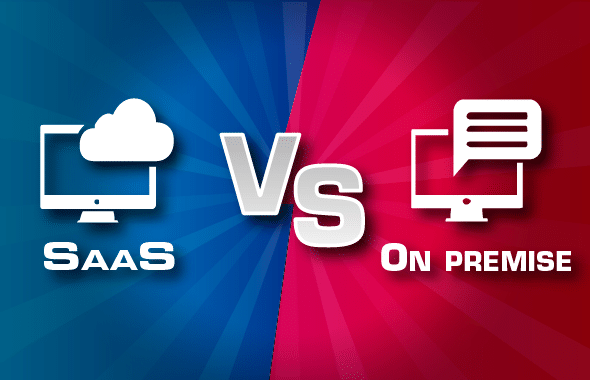
What is Cloud-based ERP and How Does it Work?
Posted on: 13 Jan, 2022
Cloud ERP vs On-Premise ERP
To understand what cloud ERP is, you first have to understand the on-premise ERP model it evolved from. ERP, which stands for enterprise resource planning, is a term that was introduced in the 1990s referring to software that automates business processes across a company. At that time, ERP systems were implemented on a client’s servers in their own data center.
Today, however, software can be delivered through the internet as a software-as-a-service (SaaS) application. This is what we call cloud-based ERP. Cloud-based solutions are offered and managed in a vendor’s cloud platform, as opposed to organizations hosting their ERP system on their servers. Rather than being purchased outright, this model can be leased monthly. There are many other distinct differences between on-premise ERP and cloud ERP software, including variabilities in flexibility and security. To provide answers on what cloud ERP is, how it works, and its benefits, let’s first walk through ERP’s evolution in more detail.
What is On-Premise ERP Software?
All ERP softwares began as on-premise solutions. On-premise ERP is enterprise resource planning software that is locally installed on a business’ hardware and servers and is managed by the business’ IT staff. The business must license the core software platform and buy or lease enterprise-grade servers, networking, and storage to run and host the software and its data.
With this model, the job of securing and maintaining the software is put largely on the shoulders of the business. IT staff and other selected personnel are not only needed for initial implementation, but ongoing training and support as necessary to keep the system up to date. This is an involved, time-consuming requirement for an IT team. Implementing an on-premise solution can also take considerable time for a company to acquire approval and buy-in from company stakeholders before selecting and the deploying software.
With on-premise ERP systems, businesses only need to purchase the core platform once, which sounds positive. However, businesses inevitably must invest further money to maintain and update their system, keep the supporting infrastructure current, troubleshoot, and hire installation experts, as well as maintain antivirus and other security software. Without these regular updates and maintenance, system functionality, usability and security can suffer. This time and financial investment of on-premise ERP software can limit businesses instead of helping them stay ahead, as ERP software is intended to do.
What is Cloud ERP Software?
A cloud ERP system is enterprise resource planning software that is hosted and managed offsite in the cloud by a vendor. That vendor is responsible for the application, data storage, underlying operating systems, servers, physical data center infrastructure, security updates, and feature upgrades, which takes a tremendous burden off of the business.
In addition, while on-premise ERP systems were limited to enterprises, the cloud model allows small and medium-sized companies to enlist ERP capabilities. Because cloud ERP solutions don’t require the same level of financial, time, and personnel investment, these smaller companies are able to benefit from process automation, enhanced efficiency, improved data accuracy and streamlined, strategic business performance.
This evolution from on-premise ERP solutions has been pivotal for enterprises, with the first cloud ERP system being offered in 1998. Businesses no longer needed to purchase a system only to be continually expected to financially maintain it. They also no longer had to dedicate valuable IT staff time to software maintenance or endure lengthy implementation times and complicated upgrades. Initial cloud ERP offerings through the mid-2000s, however, were limited in functionality and not without flaws, nor were they even truly designed for the cloud. This made them difficult for enterprises to fully embrace. These early solutions were inflexible and hard to integrate, which stunted businesses. Today’s cloud-based ERP offerings have evolved out of many of these limitations and now provide substantial benefits.
What Are the Benefits of Using a Cloud ERP Solution?
There are extensive benefits to using cloud-based ERP systems, with the following being leading reasons why businesses opt for cloud ERP solutions over on-premise.
Cost
One of the most enticing benefits to cloud ERP is the lower upfront and ongoing operating costs as compared to on-premise. With on-premise ERP systems, a business pays for the initial software license as well as the necessary servers, energy costs, IT staffing, consultants, backup, security, database creation and management, and ongoing maintenance and upgrades. With cloud ERP, the vendor handles all maintenance, support, upgrades, and security for the business, allowing companies to only pay for the resources they need and not continually accrue various expenses that branch off from their initial software investment. Not only are costs reduced, they’re also more transparent. Cloud ERP users will either pay a monthly subscription or follow a pay-per-use model, making costs predictable and easier to manage.
Upgrades
On-premise ERP solutions require significant time and, potentially, hired contractors to perform necessary software updates and upgrades. A cloud ERP system, however, can take as little as 30 minutes and typically occurs off hours. Combined with the fact that vendors take care of updates results with little to no burden or interruption to the business means systems are always equipped with the latest, most valuable technology.
Implementation Time
Implementation is often one of the biggest challenges businesses face when enlisting new software. It can be a lengthy process that commonly extends beyond target deployment dates. Cloud ERP solutions fortunately reduce implementation times greatly. There’s no time spent selecting and purchasing hardware, hiring or training IT personnel, creating new data security protocols, etc. The implementation process for cloud solutions is much quicker and far less complex for a business.
Accessibility
A significant benefit of ERP cloud services is the ability to access software and tools on any mobile device from anywhere there is an internet connection. Because the solution is hosted and managed in the cloud, the business as well as its approved suppliers, partners, and customers, can access information in real time. This allows business personnel to communicate, collaborate, perform tasks and make business decisions wherever they are without having to be together or on-site.
Scalability
Another notable benefit is that cloud ERP systems can more easily grow with a business than on-premise solutions. Businesses can start with more basic functionality and then add more as needed without buying new hardware. Because local servers aren’t needed with cloud solutions, and because cloud vendors have data centers throughout the world, new units can be brought online quickly around the globe and businesses can adapt more rapidly.
Customizations
While customizations can be made with on-premise software, those customizations are limited to the current software version and potentially can not be easily reimplemented with newer software versions. This hassle is one reason businesses opt to let technology become out of date, which is not a good business practice. Cloud ERP can be easily fitted to a business’ needs, and new modules can be added to cloud systems without downtime or acquiring new hardware.
Security
Having an outside vendor host company data is understandably concerning for any business, however, reputable cloud-based ERP providers tend to provide a higher level of security and compliance than businesses alone can typically afford. On-premise solutions come with the risk of considerable data loss, especially in the event of a technology failure, natural disaster or theft. Cloud providers offer enterprise-grade security and end-to-end data encryption. They have disaster recovery procedures and ensure data is safely backed up at all times.
Integration
Cloud systems are also able to easily integrate with many other solutions, such as QMS, MRP and CRM software. Some cloud ERPs even have full-service enterprise platforms that seamlessly work together for streamlined communication and management across a variety of business functions. Don’t underestimate the measurable benefit integrated solutions can have on business success. Connecting your ERP and CRM solutions, for example, provides enhanced visibility into your entire supply chain, helping employees, departments and partners collaborate to offer a better customer experience.
Business Productivity
A final leading reason businesses often lean toward cloud-based versus on-premise ERP software is its overall efficiency, which promotes improved business productivity. When a business doesn’t have to worry about allocating time, budget, or personnel to the frequent monitoring and maintenance of an on-premise solution, it’s free to focus on more valuable business needs that contribute to growth.
How Do Cloud-based ERP Systems Work?
Cloud-based ERP systems help to increase the efficiency and connectivity of an organization by managing and improving how company resources are utilized without the maintenance and resource requirements of an on-premise solution. Cloud-based solutions provide the flexibility and mobility to access an ERP system and its connected solutions through the vendor’s cloud platform. Cloud-based software can be accessed through connected local devices, like a laptop, phone or tablet, which can provide secure, accurate data, notifications and insights in real-time to help make informed business decisions.
Business needs for a cloud-based ERP system can vary, which in turn means all ERP implementations vary as well. At QAD, there are 5 key steps for successful ERP implementation that are followed, but all implementations generally start with the engagement of an ERP consultant or vendor to help identify a solution that can help meet a business’ needs and collaborate with them to create an implementation plan.
What Are the Different Types of Cloud ERP Deployment Strategies?
One thing to note is that not all cloud systems are the same, and some models may lead to businesses missing out on certain benefits. Learn about each type of cloud ERP software below.
Multi-Tenant SaaS
Many cloud systems are multi-tenant SaaS. A multi-tenant model means that a single version of the software and its infrastructure is utilized by multiple organizations. Though different organizations use the same software hosted by the same server, each organization’s data is inaccessible by others.
Single-Tenant SaaS
Just like it sounds, this model involves only one organization that uses a single system and its infrastructure. That organization’s data is hosted on a private server.
Public Cloud
With public cloud usage, multiple organizations share cloud computing services that are owned by the vendor. This is the case with Amazon Web Services and Google Cloud, to name a couple examples.
Private Cloud
This is cloud usage not shared with any other organization.
Hybrid Cloud
A hybrid model combines on-premise software with a private or public cloud.
Are There Any Challenges to Using a Cloud-based ERP?
There are benefits and drawbacks to nearly every technology offering. A few of the challenges that can accompany cloud-based ERP software include:
- The transition from on-premise to cloud ERP systems can be a steep undertaking for an organization
- When vendors manage all maintenance, infrastructure, etc. of a cloud-based system, businesses can feel a potentially uncomfortable loss of control, unlike with legacy on-premise systems an organization may have used and created procedures for decades ago
- Ensuring regulatory compliance
- Assurance about data security
- Cloud options can be less customizable than some on-premise systems, though with API integrations and other low code / no code implementations, they can potentially have customizations be deployed easier and without as many IT resources
How Can a Cloud-based ERP System Improve Your Day-to-Day Manufacturing Operations?
Cloud-based manufacturing ERP software gives today’s manufacturers a critical advantage. The business environment is rapidly changing and disruptions mean manufacturers must be constantly ready to adapt. Manufacturing companies need software that can quickly and seamlessly adapt with them and be flexible enough to grow in tandem with the business as changes occur.
Specific cloud ERP benefits for manufacturing operations include:
- Efficiency & Productivity – A solution that enables manufacturing companies to integrate all their processes, connects departments for better communication and provides full-view visibility across the company for improved decision making.
- Protection – Cloud vendors are able to provide state-of-the-art security. Data collected is encrypted and only accessible by authorized users.
- Agility – Cloud solutions can be accessed on a mobile device, such as a smartphone, anywhere, anytime as long as an internet connection is available, allowing users to engage as needed around the globe.
- Reduced Costs – Cloud ERP runs on a subscription with maintenance and support included, so the expense is not only predictable and consistent, it’s less than that of on-premise ERP that requires ongoing cost offshoots.
- Scalability – A cloud solution can quickly adjust as your business grows, whereas on-premise solutions are slow and complicated to adjust and may eventually not be able to meet an expanding business’ needs.
- Customer Satisfaction – The efficiency cloud ERP provides a business, along with the integration of CRM systems that enhance communication across a business, enables manufacturers to provide a better overall customer experience.
Would My Organization Benefit from ERP Cloud Services?
Considering the benefits, most organizations would profit from adopting ERP cloud services. The return on investment is considerably greater than implementing an on-premise ERP solution. Consider the following:
- Does your business collaborate with vendors and partners around the world?
- Is your business ready for the next stage of growth and profitability?
- Are you interested in ERP software but can’t afford on-premise requirements?
If the answer is ‘yes’ to these questions, cloud ERP is an attractive option. It has the usability and accessibility for global business needs. It also makes it easy to scale operations to meet changing demands and business needs. Plus, it’s a streamlined model at a fraction of the cost of on-premise offerings.
While it’s rare to adopt new technology and experience zero challenges, adopting cloud ERP software can be relatively quick, affordable and worthwhile.
Finding Cloud ERP Success
Cloud ERP success begins with selecting a qualified vendor that conducts a successful implementation, providing a business with a team of experts throughout the process. The key to success when setting up businesses using cloud systems is a partnership between the business and vendor. A successful implementation is a journey, and vendors and businesses must be open and transparent, effectively communicating needs and limitations to get the desired end result.
Dhanaina offers expert Consulting and Transformation services to guide customers through the implementation process and lead them through rapid, agile and effective digital transformation. Our adaptive cloud ERP helps manufacturers combine resource planning, supply chain management and other solutions to better identify and address industry change so they can stay ahead of the competition.



Comments (0)
Post Your Comment